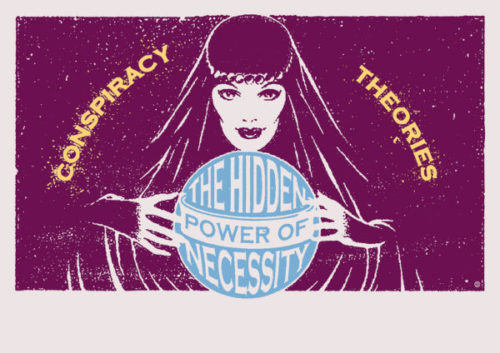Stephen Copeland: Pattern Recognition is One of the Main Causes of Conspiracy Theories |
Joseph Gonzalez: We Have a Need for Control |
Olivia Pierce: People want to blame others for things they can’t explain |
Isabella Ponterio: Lack of Control & Skeptical Perspectives |
Additional Resources about Conspiracy Theories |
Human beings are curious individuals always searching for answers; due to each person’s form of individuality, everyone looks for their own form of an answer, or theory. There are many individuals that feel outcast by the United States government and current events around the world. This inevitably allows these individuals to wish to find their own reasons as to why certain things occur in our country.
A theory is an explanation that is supported by a reasonable amount of evidence. It is stronger than a hypothesis, and infinitely stronger than guesswork. A theorist is simply someone who proposes a particular theory. On the other hand, A conspiracy is two or more people working together in secret, outside the rules of a social institution, to do something against the interests of others. When defined separately, it helps us to further unpack this question.
Another aspect responsible for creating conspiracies throughout our society is just simply experience. Every individual has their own set of experiences and influences, whether they be cultural or due to their education, all these factors come together to make a big picture idea for society. James Baldwin uses the theory of language to show how we are affected within our society; conspiracy theories are spread through use of language and have the ability to morph within the eye of the media. During times of difficulty, human beings try to piece together what had happened by coming up with these theories that connect it to a bigger object than what it actually was. The difficult aspect of understanding conspiracies is that similar to understanding individuals, all perspectives are subjective based on opinion. This is why many conspiracy theories seem unfathomable to many individuals, purely due to the lack of understanding. People like to understand problems and events, especially ones that seem to change their usual way of thinking or understanding. Some individuals want to have some sort of control in their environment. When events happen that they cannot seem to understand or process, they look to someone or something to blame. Joseph E. Uscinski, associate professor of political science at the University of Miami and co-author of “American Conspiracy Theories’, wrote a compelling argument as to why people believe conspiracy theories. In The Washington Post article by Joseph E. Uscinski, Uscinski uses a spectrum theory to discuss how and why it’s possible for individuals to believe in conspiracy theories:
“People on the opposite end of the spectrum are unlikely to accept conspiratorial beliefs, even when mounting evidence suggests that something is afoot. The folks on this extreme might be thought of as naive; conspiracy theorists often refer to them as “sheeple.” Most people are somewhere in the middle — they believe in some conspiracy theories but reject most.” ~ Joseph E. Uscinski
In many cases, it is the government. They blame the government for the way events happened because if they cannot have control of their surroundings, then they want to point a finger at someone for taking that control away from them. People are more common to believe conspiracies that impact devastating or harmful events than to accept that it was one random horrific act. Human beings are curious individuals always searching for answers; due to each person’s form of individuality, everyone looks for their own form of an answer, or theory. There are many individuals that feel outcast by the United States government and current events around the world, this inevitably allows these individuals to wish to find their own reasons as to why certain things occur in our country. Another aspect responsible for creating conspiracies throughout our society is just simply experience. Every individual has their own set of experiences and influences, whether they be cultural or due to their education, all these factors come together to make a big picture idea for society. Conspiracy theories gain power through language. As people speak of rumors and theories, their main purpose can sometimes get skewed because of varying opinions and selection bias. By looking at what the most popular conspiracies are, and seeing what effects they have on people can determine the importance and influences they have. This will help to determine why people become so invested in conspiracies, especially ones that involve the government.
